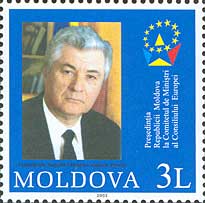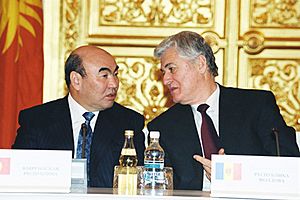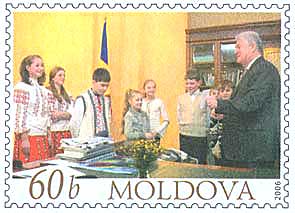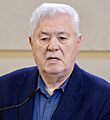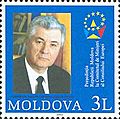Vladimir Voronin facts for kids
Quick facts for kids
Vladimir Voronin
|
|
|---|---|
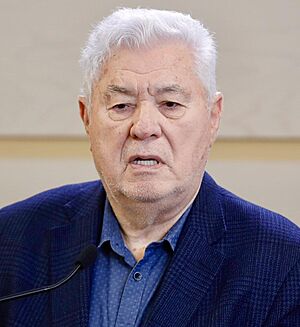
Voronin in 2024
|
|
| Member of the Moldovan Parliament | |
| Assumed office 23 July 2021 |
|
| Parliamentary group | Bloc of Communists and Socialists |
| In office 22 April 2009 – 9 March 2019 |
|
| Parliamentary group | Party of Communists |
| In office 17 March 2005 – 8 April 2005 |
|
| Succeeded by | Alexandru Jdanov |
| Parliamentary group | Party of Communists |
| In office 9 April 1998 – 18 April 2001 |
|
| Succeeded by | Valeriu Burca |
| Parliamentary group | Party of Communists |
| President of the Party of Communists | |
| Assumed office 24 December 1994 |
|
| 3rd President of Moldova | |
| In office 7 April 2001 – 11 September 2009 |
|
| Prime Minister | Dumitru Braghiș Vasile Tarlev Zinaida Greceanîi |
| Preceded by | Petru Lucinschi |
| Succeeded by | Mihai Ghimpu (acting) |
| President of the Moldovan Parliament | |
| In office 12 May 2009 – 14 August 2009 |
|
| President | Himself |
| Prime Minister | Zinaida Greceanîi |
| Deputy | Vladimir Țurcan Grigore Petrenco |
| Preceded by | Marian Lupu |
| Succeeded by | Mihai Ghimpu |
| Minister of Internal Affairs of the Moldavian SSR | |
| In office 17 February 1989 – 24 May 1990 |
|
| Premier | Ivan Calin Petru Pascari |
| Preceded by | Gheorghe Lavranciuc |
| Personal details | |
| Born |
Vladimir Bujeniță
25 May 1941 Corjova, Moldavian SSR, Soviet Union (now Moldova) |
| Citizenship | |
| Political party | Communist Party of Moldova (Before 1991) Party of Communists of the Republic of Moldova (1993–present) |
| Spouse | Taisia Mihailovna |
| Children | 2, including Oleg Voronin |
| Alma mater | Cooperation College All-Union Institute for Food Industry Academy of Social Sciences Soviet Academy of the Ministry of Internal Affairs |
| Military service | |
| Allegiance | |
| Branch/service | |
| Years of service | 1989–1990 |
| Rank | Major general |
Vladimir Voronin (born Vladimir Bujeniță, 25 May 1941) is a well-known politician from Moldova. He served as the third President of Moldova from 2001 to 2009. Since 1994, he has been the leader of the Party of Communists of the Republic of Moldova (PCRM). He was the first democratically elected leader of a communist party in Europe after the end of the Eastern Bloc.
Contents
Family and Education
Vladimir Voronin was born in the village of Corjova. At that time, it was part of the Moldavian Soviet Socialist Republic. His biological father passed away during World War II. He was raised by his stepfather, Nikolai Voronin.
Voronin studied at several institutions. He graduated from the Cooperation Tekhnikum in Chișinău in 1961. Later, he attended the All-Union Institute for Food Industry in 1971. He also studied at the Academy of Social Sciences and the Academy of the Ministry of Internal Affairs of the Soviet Union. His studies covered economics, engineering, political science, and law.
Early Career
Voronin started his career in 1961 as a bakery manager in Criuleni. From 1966 to 1971, he was a vice-director and then head of a bread factory in Dubăsari.
After 1971, he became active in the government of the Moldavian SSR. He held various positions in local and district executive committees. In 1983, he became an inspector for the Communist Party of Moldova. From 1985 to 1989, he was the first secretary of the Bender City Committee of the Communist Party. Between 1988 and 1990, he served as the Minister of Internal Affairs for the Moldovan SSR.
In 1993, Voronin helped create the Party of Communists of the Republic of Moldova (PCRM). He was important in bringing the Communist Party back after it was banned. In 1994, he was elected President of the PCRM. He ran for President of Moldova in 1996. In 1998, he was elected as a Member of Parliament. He also led the PCRM's group in Parliament.
In 1999, President Petru Lucinschi nominated Voronin to be Prime Minister of Moldova. However, he did not get enough support from Parliament. In the 2001 parliamentary election, he was again elected as a Member of Parliament.
Presidential Career
First Term as President
In the February 2001 parliamentary election, the PCRM won 50.07% of the votes. This gave them 71 out of 101 seats in Parliament. At this time, the constitution had changed so that the President was chosen by Parliament, not by popular vote. On 4 April 2001, Voronin was elected President by the Parliament. He received 71 votes. He officially took office on 7 April 2001. The Constitutional Court of Moldova allowed him to also lead a political party, so he remained the PCRM's leader.
As President, Voronin focused on reducing poverty in Moldova. He put more money into healthcare, education, and increasing pensions and salaries. These actions helped him keep public support. However, Moldova remained one of the poorest countries in Europe during his time as president. A large part of Moldova's economy came from money sent home by Moldovans working abroad.
In 2002, some groups protested against government ideas. These included proposals for more use of the Russian language in schools. The government worked with the Council of Europe to find solutions.
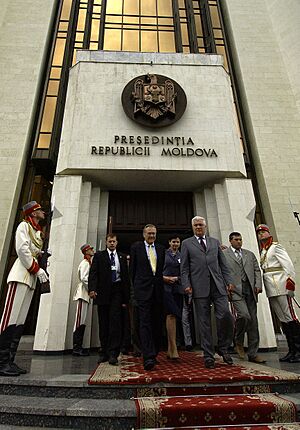
In 2003, Voronin's government decided not to sign a deal with Russia about the region of Transnistria. In 2004, he ordered an economic blockade of Transnistria. This happened after authorities there closed some schools that taught in Romanian.
Second Term as President
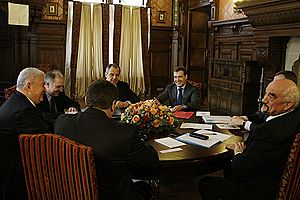
In the March 2005 parliamentary election, the PCRM won 46.1% of the votes. This gave them 56 seats. This was enough to stay in government but not enough to elect a president on their own. However, President Voronin received support from other parties. He promised to make important reforms and work towards Moldova joining the European Union. On 4 April 2005, Voronin was re-elected President with 75 votes.
Political Goals During His Time in Office
His main goals as president included:
- Building stronger ties with Russia and working with Europe.
- Finding a solution for the Transnistria conflict.
- Cooperating with the European Union and possibly joining it.
- Opposing NATO membership for Moldova.
- Keeping Moldova independent and not uniting with Romania.
Events of 2009 and Resignation
After the parliamentary election on 5 April 2009, the PCRM won 49.48% of the votes and 60 seats. This was one seat short of what was needed to elect a President. Voronin became the President of the Moldovan Parliament and remained President of Moldova temporarily. After some public protests in April 2009, the Communist Party could not get the extra vote needed from other parties. This led to a new election.
In the snap parliamentary election in July 2009, the PCRM won 44.69% of the votes and 48 seats. They lost their majority to a group of opposition parties. However, this new group also did not have enough seats to elect a President. On 2 September 2009, Voronin announced he would resign. He said his position as acting President had become unclear. He officially resigned on 11 September 2009. Mihai Ghimpu took over as acting president until a new President could be chosen.
After His Presidency
After leaving office, Vladimir Voronin continued to be involved in politics. In February 2010, he and his wife returned their diplomatic passports.
In 2019, opinion polls showed Vladimir Voronin was among the most trusted politicians in Moldova. In 2023, he spoke out against the authorities. He said that people's rights to speak freely were being limited. He mentioned that several TV channels and news websites had been closed.
Political Views
Vladimir Voronin considers himself a left-wing politician. However, he holds traditional views on social issues. He is against immigration and the building of mosques in Moldova. He also does not support LGBT rights.
He believes that Moldovans and Romanians are different ethnic groups. Some of his statements have been seen as against Romania.
Relations with Russia
In 2001, Vladimir Voronin had a strong pro-Russian stance. He was against groups that wanted closer ties with Europe or unification with Romania. Russia's support helped him gain votes from Russian-speaking people in Moldova. This also included Moldovans working in Russia and their families.
However, after winning the election, Voronin started to focus on Moldova joining Europe. He did not keep some promises about the Russian language or talks on Transnistria. Because of this, his relationship with Russia became less friendly.
In 2009, Voronin visited Russian President Dmitry Medvedev. He hoped to get support for his party to keep power in Moldova. In 2013, for his party's 20th anniversary, Voronin expressed sadness about the end of the Soviet Union. He supported Moldova joining the Russia-led Customs Union. He also criticized Moldovan leaders at the time. He accused them of being corrupt and not working to reunite Transnistria.
In 2015, Voronin said that as president, he rejected Russia's plan to give more power to Transnistria. He admitted that relations with Moscow had "cooled considerably" since then. He saw relations with Russia as a strategic partnership within the CIS (Commonwealth of Independent States).
The Voronin Family and Public Accusations
The family of Vladimir Voronin has a reputation for being very wealthy in Moldova. From 1999 to 2006, companies linked to the Voronin family acquired land in expensive areas of Chișinău. Elite properties built there are said to belong to his son Oleg, grandson Aleksei, and daughter Valentina.
Despite many accusations from political parties and media, law enforcement agencies stated they found no proof of wrongdoing. In 2009, a poll showed Vladimir Voronin as a leading figure in public perception of corruption.
In 2010, his son Oleg Voronin was investigated for possible money laundering and tax evasion. Offices of companies owned by Oleg were searched. However, he was not officially named a suspect or accused. This investigation followed media reports about large spending from a bank card supposedly belonging to Oleg. These reports suggested he spent millions on shopping and luxury hotels. Oleg denied these rumors. After two years, the investigation was closed due to a lack of evidence.
Vladimir Voronin is considered one of the richest people in Moldova. His wealth has been estimated at a high amount. There have been reports of real estate in California, Greece, and Germany. Also, a private health resort in the Czech Republic and a collection of cars have been mentioned.
Reports suggest that the Voronin family started buying properties abroad around 2002. These included hotels, stores, mansions, and land in Austria. There were also reports of a mansion in Munich, Germany, and a private airplane. The plane was reportedly kept ready for the family in case of danger. A significant amount of state money was also spent on the president's flights.
Vladimir Voronin is known for his car collection. Journalists have written about a garage of luxury and classic cars. His son, Oleg Voronin, is reported to own several expensive cars. There are also statements about the family owning a mansion between Strasbourg, France, and Baden-Baden, Germany.
In 2019, Vladimir Voronin's family was again involved in a public issue. The National Bank of Moldova found that a group of shareholders in Fincombank, including Oleg Voronin's family, had bought a large share of the bank without permission. This was against the law. The bank ordered them to sell their shares. Oleg Voronin lost his shares in Fincombank.
Accusations of Racism
On 18 February 2012, Vladimir Voronin publicly made insulting comments about a Moldovan political activist of Sudanese origin, John Onoje. These comments referred to the activist's skin color. Amnesty International asked authorities to investigate the incident.
In 2021, Vladimir Voronin was reported to the Council for the Prevention and Elimination of Discrimination and Equality. This was for comments he made about "brown children" being born in Moldova if NATO arrived. These words were seen as xenophobic and racist.
Personal Life
Vladimir Voronin is married to Taisia Mihailovna Voronina, who is Ukrainian. They have two children, a son named Oleg and a daughter named Valentina. His wife works as a kindergarten manager. They married on 12 October 1962.
He holds the military rank of Major General from the former USSR Ministry of Internal Affairs. Some people believe he also has Russian citizenship. This is because he received a pension as a former Russian Ministry of Internal Affairs employee. This was from when he lived in Moscow between 1991 and 1993. His son, Oleg Voronin, is a well-known businessman in Moldova. His daughter, Valentina, is a doctor and is not a public figure.
Honours and Awards
- Knight Grand Cross of the Grand Order of King Tomislav (Croatia, 21 March 2007)
- Order of Prince Yaroslav the Wise I degree (Ukraine, 24 May 2006)
- Order of the Holy Blessed Governor Stefan cel Mare I degree (Orthodox Church of Moldova, 25 May 2006)
- Order of the Savior (Greece, 13 June 2007)
- Grand Order of King Tomislav (Croatia, 17 February 2009)
- Order of the "Stara Planina" (Bulgaria, 12 March 2009)
- Order of the Cross of the Holy Sepulcher (Jerusalem Orthodox Church, 23 June 2009)
- Order of Holy Prince Daniel of Moscow (Russian Orthodox Church, 10 October 2011)
Images for kids
See also
 In Spanish: Vladímir Voronin para niños
In Spanish: Vladímir Voronin para niños
 | Emma Amos |
 | Edward Mitchell Bannister |
 | Larry D. Alexander |
 | Ernie Barnes |


